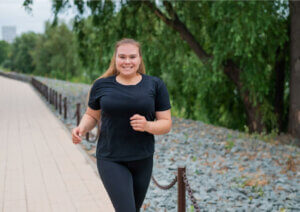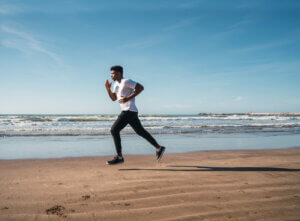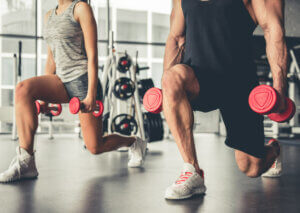3 Tips to Lose Weight by Running

Running to lose weight can be a really enjoyable way of getting into shape. However, the pounds aren’t going to magically fall off because you’ve suddenly started jogging.
If you want to lose weight by running, you need to bear a few things in mind, such as diet, intensity, and in particular, persistence. Remember, when it comes to training, planning is key. If you love running or think it might be a good way to lose weight, we’ve got some useful tips for you.
Is running an effective way to lose weight?
If you want to lose weight, you might have looked at a number of different options. The most popular tend to be cycling and swimming, and why not? They’re very complete forms of exercise if you’re looking to get into good shape.
However, swimming and cycling also have downsides that can be somewhat problematic: the equipment. If you don’t have a swimming pool nearby or a good bike, then these aren’t likely to be very useful suggestions, regardless of how much you want to lose weight.
However, running doesn’t have this problem. This doesn’t mean that running should be a last resort. It’s just that it’s the easiest to do, and it doesn’t need any special equipment or a particular climate to do it.
As well as being the easiest option, it’s also really effective as it’s a great way to burn a lot of calories. However, how many calories you burn will depend on the intensity.

Tips to lose weight by running
As we mentioned, there are a number of things to bear in mind if you want to effectively lose weight by running. If you take these tips on board, you’ll be much more likely to lose weight.
Don’t skip meals
One of the main mistakes that people make when they want to lose weight is to blame their food. Obviously, what and how much you eat does have an impact on your body shape, but it’s also the main way that your body gets energy. If you don’t eat, you won’t be able to do any form of exercise, let alone running.
Therefore, skipping meals is a bad choice and it can affect your metabolism and other bodily functions. A far better idea is to try and establish a balanced diet that provides your body with the energy it needs, which can be different for each person.
Increase intensity
Intensity can vary quite a lot in running. Although you might be more familiar with steady races such as marathons or other races, there are many intensity levels that you can train at.
However, it’s best to increase the intensity by time intervals if you want to burn the most calories. You can do this type of training at least twice a week at sub maximum intensities, with a heart rate of around 140-150 bpm at between 50-80 percent maximum effort.
Bear in mind that running at high speeds can have an effect on the body, so don’t do it every day. Your body needs rest too.
Complement running with other forms of exercise
Running will burn calories, but it might not be enough. It all depends on your objective and how much weight you want to lose.

The best idea is to include strength training in your exercise plan. It doesn’t have to be the main part of your routine, but you should try to include it once a week.
If you increase lean mass, you’ll burn more calories as your muscles will need more energy to work. Furthermore, this type of training will strengthen muscle groups related to the joints, which tend to suffer the most when running.
Come up with a plan and stick to it
The body needs to be cared for and looked after. If you really want to lose weight by running, you can’t ignore the factors we’ve mentioned above.
If you’re really serious about getting into shape, a medical examination might not be a bad idea either. And finally, remember that just because you’ve lost weight doesn’t mean that you’ve lost fat. Many people don’t realize that weight-loss can also be the result of lost muscle or fluids, and this definitely won’t help you get into better shape!
Running to lose weight can be a really enjoyable way of getting into shape. However, the pounds aren’t going to magically fall off because you’ve suddenly started jogging.
If you want to lose weight by running, you need to bear a few things in mind, such as diet, intensity, and in particular, persistence. Remember, when it comes to training, planning is key. If you love running or think it might be a good way to lose weight, we’ve got some useful tips for you.
Is running an effective way to lose weight?
If you want to lose weight, you might have looked at a number of different options. The most popular tend to be cycling and swimming, and why not? They’re very complete forms of exercise if you’re looking to get into good shape.
However, swimming and cycling also have downsides that can be somewhat problematic: the equipment. If you don’t have a swimming pool nearby or a good bike, then these aren’t likely to be very useful suggestions, regardless of how much you want to lose weight.
However, running doesn’t have this problem. This doesn’t mean that running should be a last resort. It’s just that it’s the easiest to do, and it doesn’t need any special equipment or a particular climate to do it.
As well as being the easiest option, it’s also really effective as it’s a great way to burn a lot of calories. However, how many calories you burn will depend on the intensity.

Tips to lose weight by running
As we mentioned, there are a number of things to bear in mind if you want to effectively lose weight by running. If you take these tips on board, you’ll be much more likely to lose weight.
Don’t skip meals
One of the main mistakes that people make when they want to lose weight is to blame their food. Obviously, what and how much you eat does have an impact on your body shape, but it’s also the main way that your body gets energy. If you don’t eat, you won’t be able to do any form of exercise, let alone running.
Therefore, skipping meals is a bad choice and it can affect your metabolism and other bodily functions. A far better idea is to try and establish a balanced diet that provides your body with the energy it needs, which can be different for each person.
Increase intensity
Intensity can vary quite a lot in running. Although you might be more familiar with steady races such as marathons or other races, there are many intensity levels that you can train at.
However, it’s best to increase the intensity by time intervals if you want to burn the most calories. You can do this type of training at least twice a week at sub maximum intensities, with a heart rate of around 140-150 bpm at between 50-80 percent maximum effort.
Bear in mind that running at high speeds can have an effect on the body, so don’t do it every day. Your body needs rest too.
Complement running with other forms of exercise
Running will burn calories, but it might not be enough. It all depends on your objective and how much weight you want to lose.

The best idea is to include strength training in your exercise plan. It doesn’t have to be the main part of your routine, but you should try to include it once a week.
If you increase lean mass, you’ll burn more calories as your muscles will need more energy to work. Furthermore, this type of training will strengthen muscle groups related to the joints, which tend to suffer the most when running.
Come up with a plan and stick to it
The body needs to be cared for and looked after. If you really want to lose weight by running, you can’t ignore the factors we’ve mentioned above.
If you’re really serious about getting into shape, a medical examination might not be a bad idea either. And finally, remember that just because you’ve lost weight doesn’t mean that you’ve lost fat. Many people don’t realize that weight-loss can also be the result of lost muscle or fluids, and this definitely won’t help you get into better shape!
All cited sources were thoroughly reviewed by our team to ensure their quality, reliability, currency, and validity. The bibliography of this article was considered reliable and of academic or scientific accuracy.
- Fernandez, A. C., Mello, M. T. de, Tufik, S., Castro, P. M. de, & Fisberg, M. (2004). Influência do treinamento aeróbio e anaeróbio na massa de gordura corporal de adolescentes obesos. Revista Brasileira de Medicina Do Esporte. https://doi.org/10.1590/s1517-86922004000300004
This text is provided for informational purposes only and does not replace consultation with a professional. If in doubt, consult your specialist.








